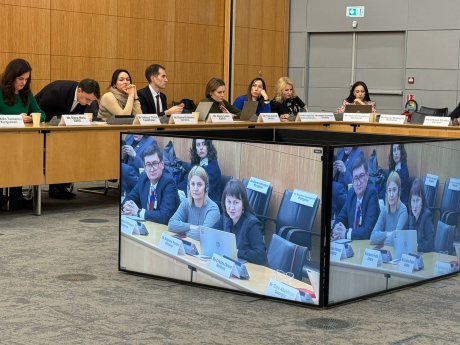UNIC facilitated a session at the OECD BIG Meeting: key takeaways

During the second day of the Business Integrity Group (BIG) Meeting organized by the OECD, representatives of the UNIC Secretariat facilitated the session "The Role of Collective Action Initiatives, Businesses, and Business Associations in Promoting a Culture of Business Integrity." The session served as a platform for an interactive discussion of challenges and solutions aimed at building an effective dialogue between businesses and authorities.
The discussion brought together representatives from various sectors across North Macedonia, Bosnia and Herzegovina, Romania, Montenegro, Lithuania, Albania, Ukraine, and Kyrgyzstan. They shared experiences in advancing business integrity and highlighted key challenges in this area. Among the obstacles businesses face when interacting with government bodies, the session participants identified the following:
- Lack of resources (financial, human, and expert), particularly in the context of new ESG requirements;
- Absence of political will from the authorities and insufficient motivation among mid-level public officials;
- Lack of institutional memory within government structures and the absence of a shared strategy for businesses and authorities;
- Corruption risks, conflicts of interest, and lack of transparency in procurement processes and legislation;
- Issues with law enforcement and low levels of trust between businesses and the state.
The discussion also highlighted the key roles of collective action initiatives, business associations, and civil society organizations in promoting business integrity. Participants emphasized the importance of collective action as a bridge between businesses and governments, fostering effective dialogue through multi-stakeholder engagement formats, such as advocacy efforts, role models, mentors, experts, and ambassadors of business integrity culture.
Summarizing the session, the Head of the UNIC Secretariat, Antonina Prudko, noted that effective dialogue between businesses and authorities requires transparency, trust, long-term initiatives, and a shared strategy aimed at mutual understanding:
"Collective business initiatives or business associations play a particularly critical role in this process. They act as mediators capable of uniting the interests of both sides and facilitating the implementation of reforms. Moreover, integrating international standards into local practices not only strengthens integrity but also enhances trust among all stakeholders involved."
UNIC extends its gratitude to the OECD for their trust and the opportunity to facilitate such an important discussion, and to the participants for their active involvement, constructive ideas, and openness to dialogue.
For reference: the participation of the UNIC delegation in the event was made possible by the project “Business Integrity as a Foundation for Sound Recovery”. This project was made possible by the support of the American and British people through the United States Agency for International Development (USAID) and UK International Development as part of the Promoting Integrity in the Public Sector Activity (Pro-Integrity). The contents of this project do not necessarily reflect the views of USAID, the U.S. Government, UK International Development, or the United Kingdom Government.




